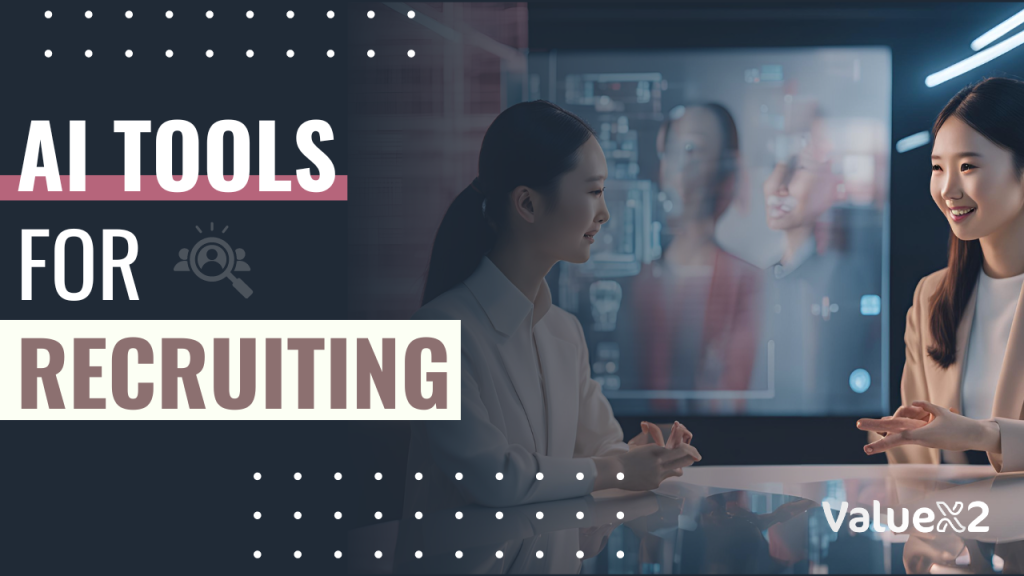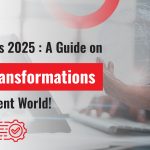Discover the list of best AI tools to boost your recruiting processes in 2025.

The dynamics of recruiting are progressively changing especially with the application of AI making the process efficient and productive. Adaptive software development and agile methodologies are two approaches to replenishing the recourses of recruiters through the use of artificial intelligence. This paper focuses on the AI recruitment technologies of 2025 and the aspects that they offer.
The Evolution of AI in Recruitment
Artificial Intelligence (AI) has significantly transformed the recruitment process, moving far beyond the old-fashioned applicant tracking systems (ATS). Today, AI is used in many different ways to improve how companies hire new employees.
Modern AI tools can handle various tasks that were once done manually. For example, they use advanced technologies like natural language processing (NLP) and data analysis to review resumes and applications. These tools can quickly filter through numerous candidates to find those who best match the job requirements.
In addition, AI enables the selection of candidates by predicting how well the candidate will perform in a company depending on the candidate’s skills, experience, and other qualities. Such systems can also be able to interact with the applicants using the chatbots’ and other forms of interfaces thus adding more flavors to the process of seeking for vacancy.
Some of the top AI Recruitment tools of 2025
Several AI recruiting tools have emerged in 2025, known for their innovative features and capabilities. Let’s take a look at them:
Hirevue
New emotion recognition algorithms have been implemented for HireVue to determine candidates’ facial expressions, voice modulation, and even their patterns of speaking with greater efficacy in terms of EI and culture match. Furthermore, it provides real-time feedback during the interview cases when the candidate can rewrite the answer; it has AI coaching, which informs the subject about better ways to perform according to past results.
XOR
XOR has enhanced the functionality of its chatbot for better processing of the natural language with the new possibilities of NLP to cover the larger amount of questions candidates might have as well as the languages they use to formulate them. It now aligns perfectly with the virtual job fairs that have continued to gain popularity automating the process of registration and engagement of the candidates as well as follow-ups. Moreover, XOR’s modified screening algorithms are thus able to better screen candidates and match them to jobs as per their ability to meet these hard skills and the so-called soft skills.
Eightfold.ai
Eightfold.ai has added the option of mapping candidates’ career paths in the future, allowing HR specialists to see not only the present but also the future development of employees. It also offers a specific depository of diversity and inclusion to help companies monitor and advance diversity hiring. Additionally, the company’s new capability, skill gap analysis, helps to define gaps for specific teams and propose training to address these gaps.
Beamery
Beamery provides talent CRM and marketing with the use of the internet and consists of predictive analytical tools to look for the correct personnel. The latest candidate engagement features in Beamery are communication plans that are built based on candidates’ behaviour and their preferences for interactions.
Turing
Turing works in the same way as other freelance platforms but it is dedicated to remote developers and uses artificial intelligence to find, filter and select candidates in the talent pool. Its platform now considers calls for technical aptitudes, writing and speaking skills, and suitability for working from home; this offers a better view of the applicant’s performance and the compatibility for distant positions. Turing also provides details on the matter of conditions and salary standards to supply organizations with the best approaches for presenting reasonable terms to talented individuals.
Pymetrics
Pymetrics collects information through games that have been designed based on neuroscience principles regarding the cognitive and affective characteristics of applicants which are invaluable to employees as they reveal applicant’s strengths and weaknesses. The ability to collect and analyze much more data has enabled the creation of new matching algorithms that increase the degree of freeing from prejudice and are closer to the scenario of matching a candidate with a particular job. Pymetrics also has features for constant interactions with the candidates, such as career coaching and further training and development suggested based on the outcomes of the game.
Ideal
Ideal utilizes the latest technological advancements to allow the aspect of HR and specifically recruitment to be simplified and to remove needless tasks so that the practitioners can engage in more fruitful activities. Ideal skips those phases of the recruitment process that take much time in most organizations with many unsuitable candidates remaining in the pool. It also manages the first message correspondence about the candidate with the company, relieving the recruiter’s workload. It has a friendly user interface and great analytical functionalities that can help recruiters arrive at decided choices and consequently improve hiring results. In the long run, Ideal spearheads a tremendous change in the process of recruitment that takes less time.
Entelo
Entelo is an AI-based platform that helps the hiring process by automating the sourcing and communication with the candidates. With sophisticated quantitate analysis, Entelo searches thousands and thousands of resumes from different sources to look for candidates that could fit the position perfectly. The platform allows for recruiters to monitor candidate interactions and their level of engagement which proves useful in the hiring process. Indeed, with Entelo’s intelligent suggestions, the organizations gain good access to hard-to-find passive candidates who might not be job hunting but are willing to make a switch if presented with a good opportunity.
Advantages of AI in Recruiting
The integration of AI in recruiting offers numerous benefits. Let’s take a look at them:
- Efficiency: The tedious routine that involves the use of resumes, calling of candidates for interviews, and first responses to the candidates are prescreened by AI tools. This means that the recruiters can shift their attention towards other strategic tasks which include hiring.
- Bias Reduction: AI makes it easier to minimize what employers have as bias since it eliminates the element of guesswork by recommending the best candidates for the given position.
- Improved Candidate Experience: Automating such processes as feedback and the provision of candidates with new information through AI chatbots and virtual assistants improves the experience of people who are concerned about the hiring process.
- Data-Driven Decisions: Through the use of AI tools, recruiters can obtain pertinent data analysis into candidates which they can use to make better decisions.
Adaptive Software Development and Agile Methodology in Recruitment
Being flexible and using agile principles are key reasons why AI tools in recruiting are so successful. These methods allow for flexibility, continuous improvement, and quick adaptation to changes, which are essential in the constantly evolving field of recruitment.
Adaptive Software Development (ASDW) is a development method that applies cyclic building and enhancement of the software based on varying feedback in each cycle. This means that in recruitment employment of AI tools can always be modified to suit the latest trends in the market and the users.
The Agile Methodology is all about focusing on the team, the customer, and delivering small, frequent updates. For recruitment teams, this means they can quickly take advantage of new technologies and market conditions. Using agile methods like Scrum and Kanban, recruitment processes become more responsive and efficient. This agility is crucial because quickly identifying and meeting employee needs can provide a significant competitive advantage.
From feedback to impact
We have created a walkthrough on AI tools for HR analytics and data-driven decision-making that shows how to plug engagement metrics straight into dashboards so if you’re looking to show better results, this article is the one you can’t miss!
And because healthy, motivated people perform better, don’t miss the companion guide to AI tools for employee wellbeing and work-life balance, perfect for pairing hard numbers insight with genuine human care.
Why this matters right now
Fresh research in the Mercer 2024 Global Talent Trends report shows that companies combining real-time feedback with data-driven action plans are 1.7 × more likely to keep their top performers for three years or longer. That’s the edge AI-powered platforms deliver.
Case Studies of AI in Recruitment
Moonbug Entertainment: Moonbug has been good at franchising its CoComelon brand by applying artificial intelligence solutions for handling vast amounts of candidate data. This has helped them in being able to locate talent that could help fuel the franchises’ expansion through new content and spin-offs (Cision) (aNb Media, Inc.) (Licensing Magazine).
Cody Time and CoComelon: In entertainment, talent has been sourced for CoComelon and other franchises with the help of AI tools. AI can diagnose the data which concerns viewers’ preferences and the brand’s expectations to list the suitable candidates for a position.
Frequently Asked Questions (FAQ’s)
- What are the main advantages of using AI tools in recruiting?
- AI tools in recruiting help minimize bias, speed up the hiring process, improve candidate and portfolio analytics, and allow recruiters to focus on other areas within talent acquisition.
- How does AI improve the decision-making cycle in recruitment?
- AI uses enhanced algorithms, artificial intelligence, and machine learning techniques to automate routine processes, sort data, and identify talent, which significantly reduces the decision-making cycle.
- What is the role of adaptive software development (ASD) in recruitment?
- Adaptive software development (ASD) in recruitment allows for flexible and responsive adaptation to changes, improving the efficiency and effectiveness of the hiring process.
- How does the agile method benefit HR operations?
- The agile method enhances flexibility in recruitment, transforms HR operations, and supports a more adaptable and efficient approach to managing talent acquisition.
- Why is AI considered a significant change in the recruitment industry?
- AI represents a significant change because it integrates advanced technologies and methodologies, such as ASD and agile recruiting, which streamline and enhance various aspects of the recruitment process.
In summary
The use of AI tools in the recruiting processes can be considered as a significant change in the industry that combines the aspects of AD and Agile Recruit. In the specified year of 2025, there are myriad forms of superior AI solutions in recruitment that aim at enhancing all-rounded hiring and reducing the decision-making cycle. These tools use enhanced algorithms, and the latest artificial intelligence and machine learning techniques for the end number of routine processes, sorting of data and even sorting of talent.
The advantages of AI in recruiting are manifold. It has the following advantages:
- It helps to minimize bias
- Assists in the quick hiring of employees
- Improves the analytics of candidates and portfolios
- It allows the recruiters to shift their attention to other areas within talent acquisition.
- Also, there is the adoption of adaptive software development in the recruitment of staff, and the application of the agile method in recruitment helps in flexibility and transforms HR operations with agile.
Learn more about Agile HR and the benefits of its certification here.
With AI as a promising and developing field in recruitment, the correlation between the software development that emerges from the agile approach and the incorporation of further AI tools holds flexibility that will likely revolutionize organizations’ relations with talent acquisition.

Sagar is an HR Agile Coach & Business Agility Consultant with 15+ years of experience in HR functions at small and large multinational corporations. He has been running an HR consulting firm for the last few years, focusing on leveraging agile methods to increase business efficiency.
Sagar is an authorized instructor for ICAgile Agility in HR (ICP-AHR) and Business Agility Foundations (ICP – BAF) training courses. He has considerable experience in coaching and training on applying agile practices for his clients, primarily HR departments. He also provides consulting for HR for Agile and Agile for HR transformation to corporates.






